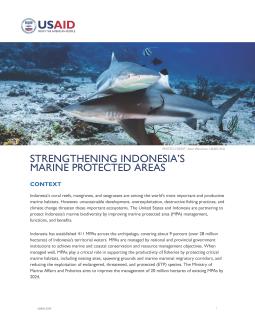Context
Indonesia's coral reefs, mangroves, and seagrasses are among the world’s most important and productive marine habitats. However, unsustainable development, overexploitation, destructive fishing practices, and climate change threaten these important ecosystems. The United States and Indonesia are partnering to protect Indonesia’s marine biodiversity by improving marine protected area (MPA) management, functions, and benefits.
Indonesia has established 411 MPAs across the archipelago, covering about 9 percent (over 28 million hectares) of Indonesia’s territorial waters. MPAs are managed by national and provincial government institutions to achieve marine and coastal conservation and resource management objectives. When managed well, MPAs play a critical role in supporting the productivity of fisheries by protecting critical marine habitats, including nesting sites, spawning grounds and marine mammal migratory corridors, and reducing the exploitation of endangered, threatened, and protected (ETP) species. The Ministry of Marine Affairs and Fisheries aims to improve the management of 20 million hectares of existing MPAs by 2024.
USAID Effective Marine Conservation (USAID Kolektif)
USAID Kolektif will strengthen the protection of Indonesia’s marine biodiversity by improving the management effectiveness of established MPAs. The project will identify existing gaps and underlying factors that limit the effectiveness of MPA management and work collaboratively to address those gaps towards well managed MPAs. Implemented by the Indonesian Biodiversity Foundation (KEHATI) in collaboration with Yayasan Konservasi Alam Nusantara (YKAN), the project will explore opportunities to involve multiple stakeholders, including private sector actors, in the co-management of MPAs to boost economic opportunities, mobilize resources, and support local livelihoods. To achieve these goals, USAID Kolektif will focus on the following objectives: (1) strengthen human resources and institutional arrangements for MPA management; (2) establish sustainable financing for MPAs; (3) increase benefits for coastal communities through the sustainable management of MPAs; (4) strengthen compliance with MPA rules and regulations; and (5) improve protection for marine ETP species and priority habitats.
Geographic Locations of Priority MPAs
USAID Kolektif works in 13 MPAs across two fisheries management areas (Wilayah Pengelolaan Perikanan Negara Republik Indonesia - WPP NRI 711 and 715). The selection of the focus MPAs is based on: (1) biodiversity significance; (2) MPA management status; and (3) socio-economic impact. The MPAs are located in Riau Islands, Bangka Belitung, West Kalimantan, West Papua, and Southwest Papua provinces.
Anticipated Results
- Improved management effectiveness of existing national and provincial MPAs in target areas to optimal or sustainably managed levels;
- Reduced drivers and direct pressures to biodiversity in the target areas; and
- Enhanced community benefits from the sustainable use and conservation of marine biodiversity in the target areas
Contact
Celly Catharina, USAID at ccatharina@usaid.gov
Wawan Ridwan, USAID Kolektif at wawan.ridwan@kehati.or.id



